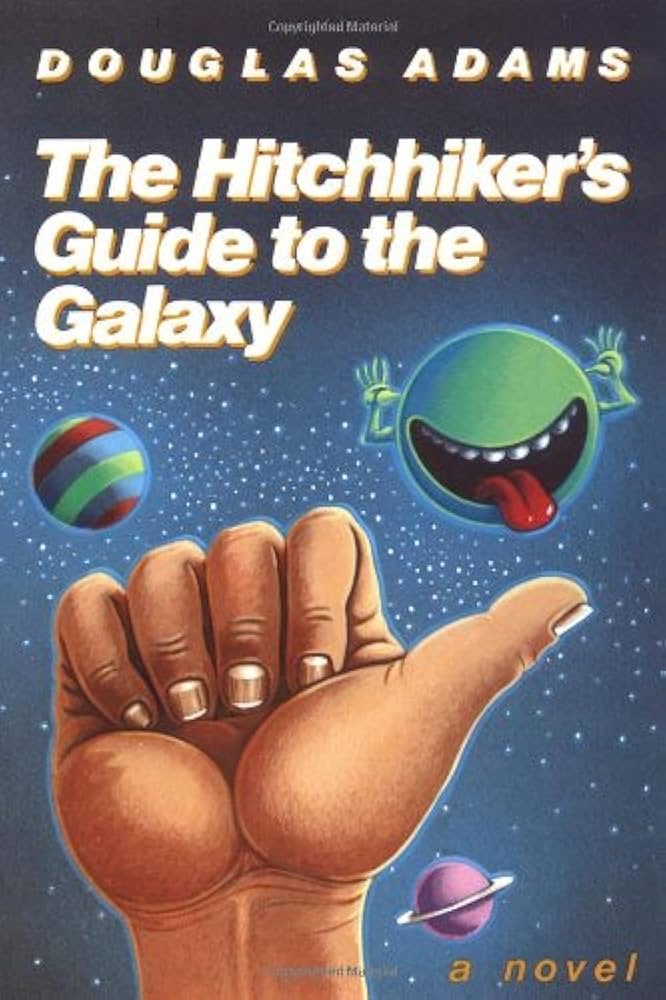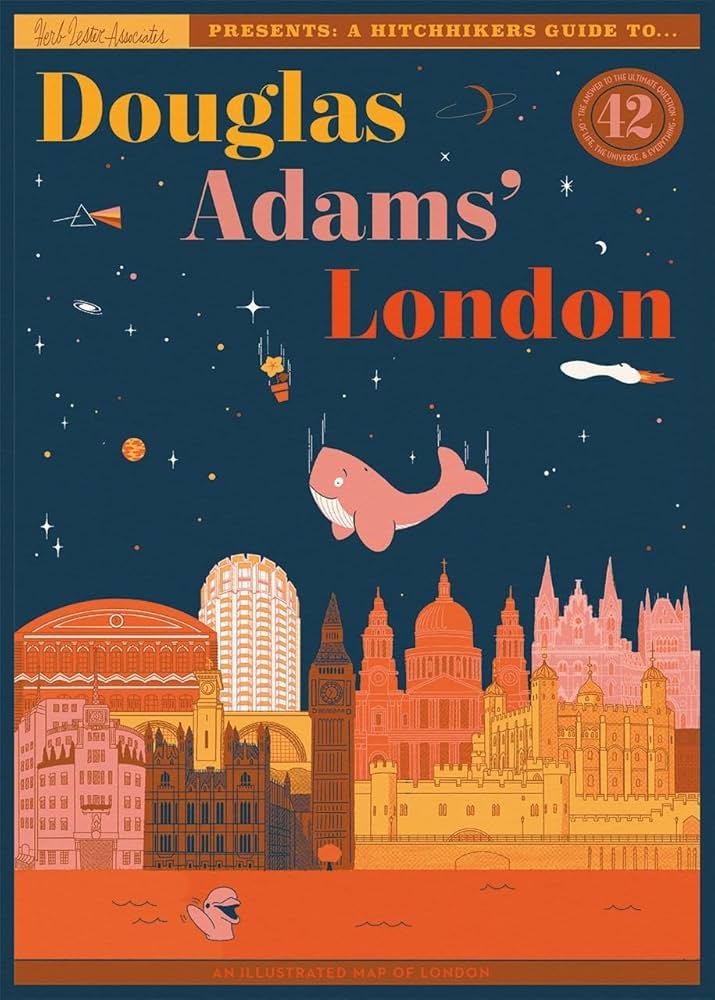Books Written by Douglas Adams: A Comprehensive Exploration

Douglas Adams, the celebrated British author, screenwriter, and humorist, left an indelible mark on science fiction and comedy with his iconic Hitchhiker’s Guide to the Galaxy series and other beloved works. His writing, characterized by its wit, absurdity, and insightful satire, continues to resonate with readers worldwide. This article delves deep into the literary landscape of Douglas Adams, exploring his books, their genres, cultural impact, and the enduring appeal of his unique style. We will examine his major works, analyze his writing style and inspirations, and assess the educational value and life lessons embedded within his narratives.
The Hitchhiker’s Guide to the Galaxy: A Multiverse of Merriment
Douglas Adams achieved phenomenal success with The Hitchhiker’s Guide to the Galaxy, a series that began as a radio comedy. The first book, published in 1979, catapulted Adams to international fame, selling over 15 million copies globally. The series’ appeal transcends the science fiction genre; at its core, it’s a comedic exploration of the human condition within a wildly improbable universe.

The Narrative Arc and Comic Timing
The story follows Arthur Dent, an ordinary Englishman whose life takes an extraordinary turn when his house is demolished to make way for a new highway – only to be followed by the Earth’s destruction by Vogon constructor fleets. This catastrophic event sets the stage for Arthur’s intergalactic adventures alongside Ford Prefect, a researcher for the titular Hitchhiker’s Guide. Their journey is a string of increasingly absurd encounters with alien races, bizarre technologies (like the improbability drive), and philosophical musings.
Adams’s genius lies not only in his inventive plot lines but also in his masterful command of comic timing. He expertly builds up grand, almost pompous sentences, only to undercut them with unexpected twists and surreal segues. This technique keeps the reader engaged, constantly anticipating the next comedic beat. The narrative structure, often described as picaresque or episodic, reflects the improvisational nature of sketch comedy, a style Adams honed during his time with the Cambridge Footlights. The “Yes, and…” approach of improvisational comedy is evident in the way he seamlessly incorporates unexpected plot developments, creating a narrative that feels both carefully constructed and wonderfully spontaneous. For example, the seemingly insurmountable problem of his heroes being ejected into the vacuum of space is resolved with the introduction of an improbability-powered spaceship, a testament to Adams’s ability to weave humor into the fabric of the narrative.

The Enduring Appeal of Adams’s Humor
Adams’s humor is multifaceted. It’s a blend of British wit, absurdist satire, and intelligent wordplay. He frequently employs puns, wordplay, and unexpected juxtapositions to create comedic effect. His humor often serves as a vehicle for social commentary, gently poking fun at bureaucratic inefficiencies, human follies, and the inherent absurdity of existence. The lack of a traditional plot structure in some of the books further enhances this, instead favouring a free-flowing stream of gags and witty observations.
The characters themselves are also a source of comedic brilliance. Arthur Dent, the hapless everyman, provides a relatable anchor amidst the chaos, while Ford Prefect’s dry wit and nonchalant demeanor add to the overall humor. And who could forget Marvin, the perpetually depressed android, whose melancholic pronouncements on the futility of existence are a constant source of dark humor?
The Hitchhiker’s Guide series resonates because it’s not just about funny aliens and spaceships. It’s a clever satire of science fiction tropes and a profound exploration of the human condition. The fact that it appeals to both science fiction aficionados and those who typically avoid the genre is a testament to Adams’s broad appeal.

Beyond Hitchhiker’s: Exploring Other Worlds of Adams’s Imagination
While the Hitchhiker’s Guide series is Adams’s most famous work, he also penned other notable books showcasing his unique blend of wit and creativity.
Dirk Gently’s Holistic Detective Agency: A Time-Traveling Mystery
The Dirk Gently’s Holistic Detective Agency series presents a different, yet equally compelling, aspect of Adams’s writing. These novels introduce Dirk Gently, a holistic detective whose methods are as unconventional and unpredictable as the universe he inhabits. The interconnectedness and seemingly random events that underpin the mystery create a narrative as playful and unpredictable as the Hitchhiker’s Guide. Adams described the first book as a “thumping good detective-ghost-horror-whodunnit-time travel-romantic-musical-comedy-epic,” which encapsulates the genre-bending nature of the story. The narrative, like the Hitchhiker’s Guide books, is more episodic, relying on witty dialogue and the surreal absurdity of its circumstances.
Last Chance to See: A Journey into Conservation
Last Chance to See, co-authored with zoologist Mark Carwardine, is a notable departure from Adams’s fictional works. This non-fiction account details their journeys to observe endangered species around the globe. While a factual account, Adams’s characteristic wit and humor shine through, making it an entertaining and informative read. The book highlights Adams’s later-life fascination with real science and big ideas, showcasing his concern for conservation. The humorous anecdotes and observations highlight the absurd situations they encountered during their travels.
The Salmon of Doubt: A Posthumous Legacy
Published posthumously, The Salmon of Doubt is a collection of Adams’s essays, articles, and the unfinished manuscript of what was intended to be either a third Dirk Gently novel or another entry in the Hitchhiker’s Guide. This collection offers a glimpse into Adams’s mind, thoughts, and writing process, solidifying his legacy and further demonstrating his wide range of interests. The unfinished novel itself is a testament to Adams’s creativity and the sheer amount of material he had already conceived.
Douglas Adams’s Writing Style and Inspirations
Adams’s writing style is unmistakable. He deftly blends humor and philosophical depth, using his wit to tackle weighty subjects in a lighthearted way. His sentence structures are often complex and meandering, reflecting the convoluted nature of his narratives. He masterfully incorporates scientific concepts and allusions, adding layers of complexity to his narratives without sacrificing their comedic appeal. His influences include Monty Python, whose improvisational comedy style is mirrored in Adams’s work, and the absurdist literature of authors like Samuel Beckett.
Cultural Impact and Awards
Douglas Adams’s works have had a significant impact on popular culture. His phrases, such as “Don’t Panic” and “42,” have become widely recognized expressions, appearing in various media and everyday conversations. The series has inspired numerous adaptations, including radio dramas, television shows, video games, and a film. While some adaptations deviate from the original material, they testify to the enduring appeal of Adams’s creations and their suitability for wider audiences.
Educational Value and Life Lessons
While primarily humorous, Adams’s books offer several life lessons. His stories encourage questioning authority, embracing the absurd, and finding humor in the face of adversity. The exploration of complex themes within his narratives creates opportunities for reflection on topics like the nature of existence, the search for meaning, and the importance of human connection. The books’ inherent absurdity serves as a reminder that life doesn’t always follow a predictable path and that finding humor in the unpredictable is a valuable skill for navigating life’s complexities.
Conclusion: The Enduring Legacy of a Comic Genius
Douglas Adams’s books transcend genre boundaries, blending science fiction, humor, philosophy, and social commentary in a unique and highly engaging manner. His works have achieved both critical acclaim and immense popularity, cementing his place as one of the most influential and beloved authors of the late 20th century. His lasting legacy is not merely a collection of hilarious books but a testament to the power of witty observation, imaginative storytelling, and the ability to find humor and meaning in the face of existential absurdity. His works continue to inspire and entertain, proving that even the most improbable adventures can offer profound insights into the human condition.